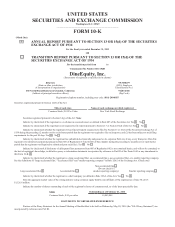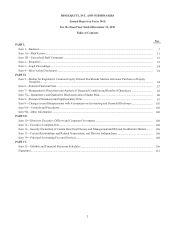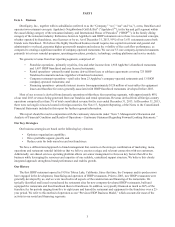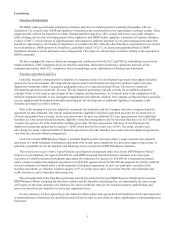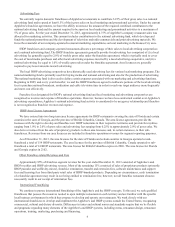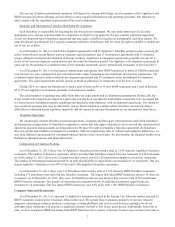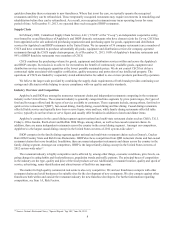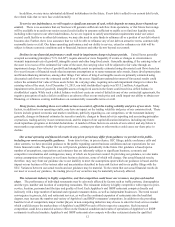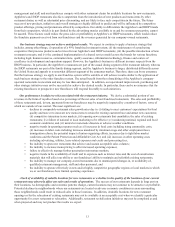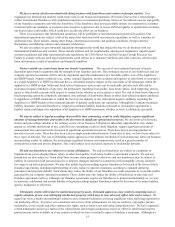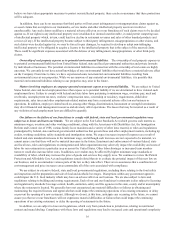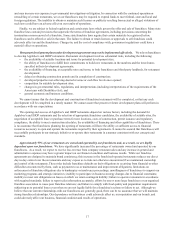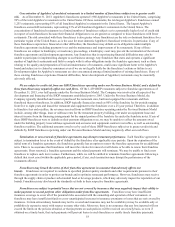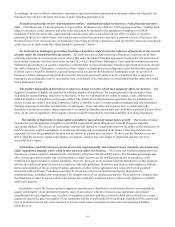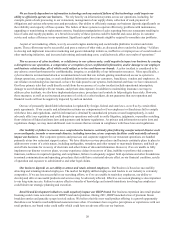IHOP 2013 Annual Report Download - page 31
Download and view the complete annual report
Please find page 31 of the 2013 IHOP annual report below. You can navigate through the pages in the report by either clicking on the pages listed below, or by using the keyword search tool below to find specific information within the annual report.10
"good cause" to exist as a basis for the termination and/or non-renewal, advance notice to the franchisee of the termination or
non-renewal, an opportunity to cure a default and a repurchase of inventory or other compensation upon termination, these
provisions have not historically had a significant effect on our franchise operations.
Each restaurant is subject to licensing and regulation by a number of governmental authorities, which may include liquor
license authorities (primarily in the case of Applebee's restaurants), health, sanitation, safety, fire, building and other agencies
in the state or municipality in which the restaurant is located. We are also subject to new laws and regulations, which vary from
jurisdiction to jurisdiction, relating to nutritional content and menu labeling.
More stringent and varied requirements of local governmental bodies with respect to zoning, land use and environmental
factors could delay or prevent the development of new restaurants in particular areas.
Various federal and state labor laws govern both our own and our franchisees' relationships with our respective employees.
These include such matters as minimum wage requirements, overtime and other working conditions. Significant additional
government-imposed increases in minimum wages, paid leaves of absence, mandated health benefits or increased tax reporting
and tax payment requirements with respect to employees who receive gratuities could be detrimental to the economic viability
of our restaurants.
In March 2010, President Obama signed the Patient Protection and Affordable Care Act and the Health Care and Education
Affordability Reconciliation Act of 2010. The legislation is far-reaching and is intended to expand access to health insurance
coverage over time by adjusting the eligibility thresholds for most state Medicaid programs and providing certain other
individuals and small businesses with tax credits to subsidize a portion of the cost of health insurance coverage. The legislation
includes a requirement that most individuals obtain health insurance coverage beginning in 2014 and a requirement that certain
large employers offer coverage to their employees or pay a financial penalty. We expect that our health insurance coverage
expenses, and the health insurance coverage expenses of our franchisees, will increase over the long term as a result of this
legislation, and any such increases could adversely affect our business, cash flows, financial condition and results of operations.
In recent years, there has been an increased legislative, regulatory and consumer focus at the federal, state and municipal
levels on the food industry including nutrition and advertising practices. Restaurants operating in the quick-service and fast-
casual segments have been a particular focus. In addition to the United States Food and Drug Administration’s proposed menu
labeling requirements for restaurants, a number of other jurisdictions around the United States have adopted regulations
requiring that chain restaurants include calorie information on their menus or make other nutritional information available.
Initiatives in the area of nutrition disclosure or advertising, such as requirements to provide information about the nutritional
content of our food, may result in increased costs of compliance with the requirements and may also change customer buying
habits in a way that adversely impacts our sales. For further information regarding governmental regulation, see Item 1A, Risk
Factors.
Environmental Matters
We are subject to federal and state environmental regulations, but historically these have not had a material effect on our
operations. We are not aware of any federal, state or local environmental laws or regulations that are likely to materially impact
our revenues, cash flow or competitive position, or result in any material capital expenditure. However, we cannot predict the
effect of possible future environmental legislation or regulations. For further information regarding environmental matters, see
Item 1A, Risk Factors.
Employees
At December 31, 2013, we had approximately 2,530 employees, of whom approximately 500 were full-time, non-
restaurant, corporate personnel. Our employees are not presently represented by any collective bargaining agreements and we
have never experienced a work stoppage. We believe our relations with employees are good. Our franchisees are independent
business owners, so their employees are not included in our employee count.
Corporate Information
We were incorporated under the laws of the State of Delaware in 1976 with the name IHOP Corp. In November 2007, we
completed the acquisition of Applebee’s, which became a wholly-owned subsidiary of the Company. Effective June 2, 2008, we
changed our name to DineEquity, Inc. Our principal executive offices are located at 450 North Brand Boulevard, Glendale,
California 91203-2306 and our telephone number is (818) 240-6055. Our Internet address is www.dineequity.com. Our common
stock is listed on the New York Stock Exchange (“NYSE”) and trades under the ticker symbol “DIN.”
We have a 52/53 week fiscal year ending on the Sunday nearest to December 31 of each year. For convenience, we refer to
all fiscal years as ending on December 31 and all interim fiscal quarters as ending on March 31, June 30 and September 30 of



